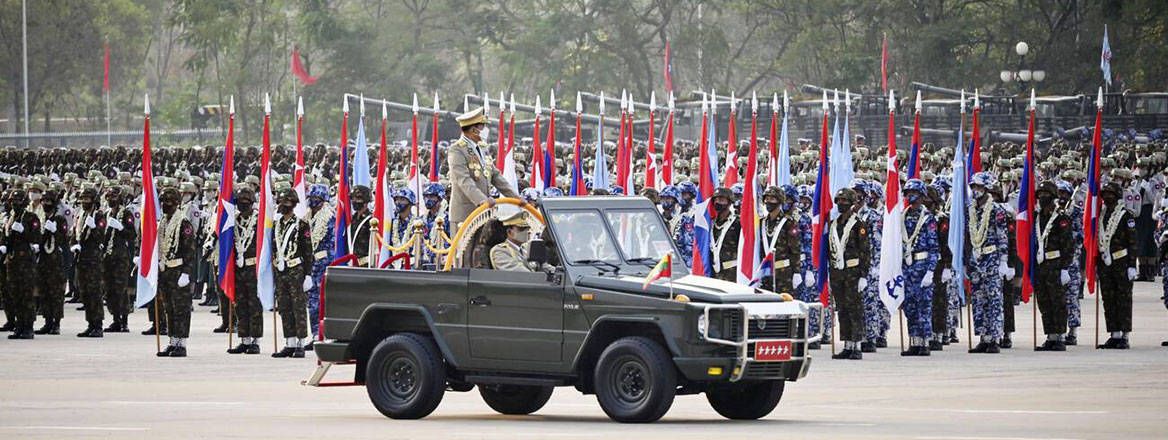Britain And Australia's Myanmar Policy: A Double Standard?

Table of Contents
Britain's Myanmar Policy: A Focus on Sanctions and Human Rights
Britain's Myanmar policy has primarily focused on targeted sanctions and strong public condemnation of the military junta's actions.
Sanctions as a Primary Tool:
Britain has implemented a range of sanctions against the Myanmar military regime, including:
- Targeted sanctions: These specifically target key individuals within the military leadership, freezing their assets and imposing travel bans. High-ranking officials responsible for human rights abuses have been directly affected.
- Arms embargoes: Britain has prohibited the export of arms and related equipment to Myanmar, aiming to restrict the junta's capacity to perpetrate violence.
- Trade restrictions: Certain trade relationships have been curtailed, impacting specific sectors linked to the military's revenue streams.
However, the effectiveness of these sanctions remains a subject of debate. Critics argue that they haven't significantly impacted the junta's behavior, while others maintain that they have at least placed some pressure on the regime and prevented the flow of funds that could fuel further atrocities. Alongside these sanctions, Britain actively supports human rights organizations working within Myanmar, providing funding and advocating for their protection.
Diplomatic Engagement and Advocacy:
In addition to sanctions, Britain actively engages in diplomatic efforts:
- International collaborations: Britain works closely with international organizations like the UN and other nations to coordinate a unified response to the Myanmar crisis. This involves lobbying for stronger action at the international level.
- Public condemnation: British officials regularly issue strong statements condemning human rights abuses in Myanmar, putting pressure on the junta through public shaming.
- Support for democratic forces: Britain supports the National Unity Government (NUG) and other pro-democracy groups within Myanmar, providing diplomatic and financial support where possible.
Australia's Myanmar Policy: A More Nuanced Approach?
Australia's Myanmar policy presents a more complex picture, seemingly balancing economic interests with human rights concerns.
Balancing Economic Interests and Human Rights Concerns:
Australia has historically maintained some economic ties with Myanmar, leading to criticisms that its response is insufficiently robust.
- Investment and trade: While Australia has imposed some sanctions, its engagement with Myanmar's economy has been more limited compared to Britain. This has led to accusations of prioritizing economic interests over human rights.
- Aid programs: Australian aid to Myanmar exists, but it's often conditional on certain reforms and improvements in human rights. However, the extent of this conditionality and its effectiveness have been questioned.
The Role of Regional Diplomacy:
Australia actively engages with regional partners, particularly within ASEAN:
- ASEAN engagement: Australia works through ASEAN mechanisms to address the crisis, hoping for a regional solution. However, ASEAN's response has been criticized as being too lenient on the junta.
- Bilateral diplomacy: Australia maintains diplomatic ties with Myanmar, albeit with a focus on human rights issues. This diplomatic approach, while aiming for dialogue, has been criticized for its lack of decisive action.
Comparing and Contrasting the Policies: Evidence of a Double Standard?
Comparing British and Australian policies reveals distinct differences that raise concerns about a possible double standard.
Effectiveness of Sanctions vs. Engagement:
The relative effectiveness of Britain's sanctions-heavy approach versus Australia's more nuanced strategy remains debatable.
- Sanctions impact: While sanctions may have some impact, their effectiveness in bringing about substantial change in Myanmar remains unclear.
- Engagement limitations: A purely engagement-based approach risks legitimizing the junta and failing to sufficiently address human rights violations. The optimal balance between these two strategies is a critical question.
The Role of Historical Context and National Interests:
Historical ties and national interests influence both nations' policies.
- Britain's historical influence: Britain's colonial past in Myanmar might inform its stronger stance on human rights, leading to a more assertive approach.
- Australia's regional focus: Australia's focus on regional stability and its engagement with ASEAN might explain its more cautious approach, prioritizing regional cooperation over unilateral action.
Criticisms and Counterarguments:
- Criticism of Britain: Some argue that Britain's sanctions are insufficient and haven't significantly impacted the junta. Others suggest that a more comprehensive approach including targeted financial measures and support for civil society would be more effective.
- Criticism of Australia: Critics accuse Australia of prioritizing economic interests over human rights, leading to a weaker response than is needed to address the crisis. Australia, in defense, points to its engagement in regional efforts and aid programs.
Conclusion: Re-evaluating Britain and Australia's Myanmar Policy – A Call for Consistent Action
Britain and Australia's Myanmar policies differ significantly, with Britain adopting a stricter sanctions-based approach and Australia exhibiting a more nuanced strategy that incorporates economic interests and regional diplomacy. Whether this constitutes a double standard is a matter of interpretation and depends on the assessment of the effectiveness of each approach. The lack of significant progress in Myanmar suggests that neither policy has been completely successful in achieving its stated goals. The inconsistencies in Western responses risk undermining the overall international effort to address the crisis. A unified, consistent, and more effective Myanmar policy, combining targeted sanctions with robust diplomatic pressure and sustained support for human rights organizations and pro-democracy movements, is urgently needed. We must demand effective Myanmar policies from Britain, Australia, and the rest of the international community to ensure a unified approach that prioritizes human rights and holds the Myanmar military junta accountable for its crimes. It is imperative that the international community moves beyond rhetoric and adopts stronger, consistent, and unified Myanmar policies to help end the suffering of the people of Myanmar.

Featured Posts
-
 Elsbeth Season 2 A Crucial Year End Deadline For The Judge Crawford Plotline
May 13, 2025
Elsbeth Season 2 A Crucial Year End Deadline For The Judge Crawford Plotline
May 13, 2025 -
 Doom Dark Ages Xbox Controllers And Wraps Now Available
May 13, 2025
Doom Dark Ages Xbox Controllers And Wraps Now Available
May 13, 2025 -
 Nba Draft Lottery Espns Changes And Their Impact
May 13, 2025
Nba Draft Lottery Espns Changes And Their Impact
May 13, 2025 -
 Air Traffic Controller Shortage High Profile Trials And Thc Drinks Todays Top News
May 13, 2025
Air Traffic Controller Shortage High Profile Trials And Thc Drinks Todays Top News
May 13, 2025 -
 A Rollerblading Accident Avoided Leonardo Di Caprios Romeo Juliet Intervention
May 13, 2025
A Rollerblading Accident Avoided Leonardo Di Caprios Romeo Juliet Intervention
May 13, 2025
